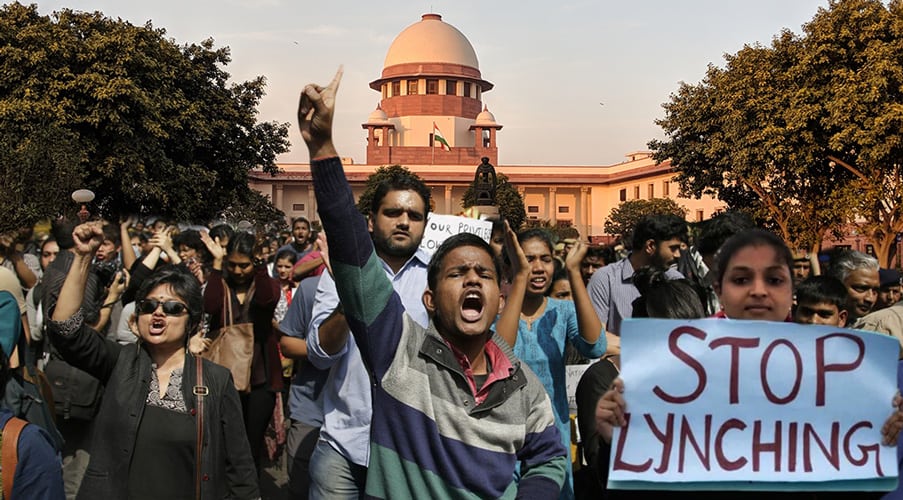The Supreme Court (SC) issued a notice to the Centre, National Human Rights Commission and state governments in a Public Interest Litigation (PIL) filed by the Anti-Corruption Council of India, a non-governmental organisation (NGO), seeking implementation of the SC’s July, 2018 directive on mob lynching.

Image Courtesy: Live Law
As reported by Bar and Bench, a bench of Chief Justice of India Ranjan Gogoi and Justice Deepak Gupta issued a notice on July 26, 2019 directing the government to implement its 2018 guidelines to prevent incidents of mob lynching. Last week, the top court had declined to hear, on an urgent basis, a contempt plea against the states. A lawyer for one of the petitioners in the case had said incidents of mob lynching had increased despite the SC’s verdict.
In July 2018, a SC bench, comprising of the then Chief Justice of India (CJI) Dipak Misra, Justices A.M. Khanwilkar and D.Y. Chandrachud, had condemned the rising incidents of mob lynching across the nation and urged the Parliament to enact a law to deal with the crime that threatens the rule of law and the country’s social fabric. In Tehseen Poonawalla versus Union of India, the SC gave a list of directions, including preventive, remedial and punitive steps, to deal with the crime. Some of the directives are:
- The state governments shall designate a senior police officer in each district for taking measures to prevent incidents of mob violence and lynching.
- The state governments shall immediately identify districts, sub-divisions and villages where instances of lynching and mob violence have been reported in the recent past.
- The nodal officers shall bring to the notice of the DGP any inter-district co-ordination issues for devising a strategy to tackle lynching and mob violence related issues.
- It shall be the duty of every police officer to cause a mob to disperse, which, in his opinion, has a tendency to cause violence in the disguise of vigilantism or otherwise
- Central and the state governments should broadcast on radio and television and other media platforms including the official websites that lynching and mob violence shall invite serious consequence.
- Curb and stop dissemination of irresponsible and explosive messages, videos and other materials on various social media platforms. Register FIR under relevant provisions of law against persons who disseminate such messages.
- Ensure that there is no further harassment of the family members of the victims.
- State governments shall prepare a lynching/mob violence victim compensation scheme.
- Cases of lynching and mob violence shall be specifically tried by designated court/fast track courts earmarked for that purpose in each district. The trial shall preferably be concluded within six months.
- To set a stern example in cases of mob violence and lynching, the trial court must ordinarily award maximum sentence upon conviction of the accused person.
- If it is found that a police officer or an officer of the district administration has failed to fulfill his duty, it will be considered as an act of deliberate negligence.
Regrettably, there has been a complete and willful ignorance of the SC directive by both, the Central and the State governments. Despite the rising crimes, we yet do not have a statutory definition of ‘lynching’, let alone the punishment and procedure. In December 2018, Manipur became the first state to formulate an anti-lynching law based on the SC directive. Just a month ago, Kamal Nath-led Madhya Pradesh government proposed to amend the state’s cow protection laws to punish perpetrators of mob lynching in the name of the cow. Now the Uttar Pradesh government is all set to follow suit with a law against mob lynching.
However, there hasn’t been any comprehensive efforts to curb the growing menace of mob lynching across the nation wherein victims are usually the minorities, particularly Muslims. In the growing times of religious polarization, the SC order comes as a much-needed relief and gives a ray of hope that the government will speed up the process to keep a check on the rising lynching cases.
Related Articles: